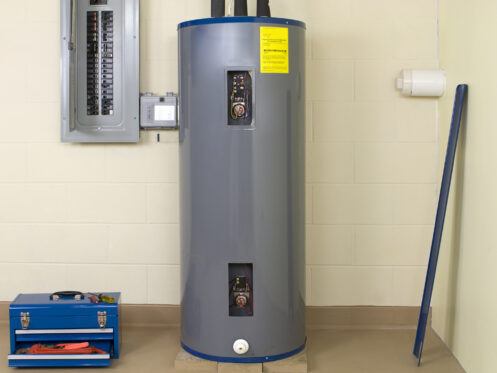Tankless water heaters (also called on-demand water heaters) have gained popularity in recent years, and for good reason. As an alternative to the traditional water heater, tankless systems provide greater energy efficiency and faster on-demand heating. But how do you decide whether a tankless water heater is right for your home? Let’s explore the pros and cons of tankless water heaters, which will help you confidently choose.
Pros of Tankless Water Heaters
There are many advantages to installing a tankless water heater. Here are some of the most important ones.
Energy Efficiency and Cost Savings
Tankless water heaters offer remarkable energy efficiency. Unlike traditional tanks that constantly heat water, tankless models operate only when hot water is needed. By eliminating standby heat loss, they can be up to 24-34% more efficient, resulting in substantial energy savings. Their on-demand heating reduces energy consumption, potentially lowering utility bills.
Additionally, their longer life span (up to 20 years compared to 10-15 for tanks) and minimal maintenance contribute to cost savings. Although the initial investment may be higher, the efficiency and longevity of tankless heaters can make them a financially prudent choice in the long run.
Lower Risk of Water Damage From Leaks
Another advantage is that tankless systems offer a reduced risk of leaks, which can lead to water damage. Unlike storage tanks prone to corrosion and eventual leaks, tankless models lack a large water reservoir, minimizing the risk of catastrophic failures. Their compact design and absence of standing water mitigate the potential for leaks. Additionally, since tankless heaters don’t store water, there’s no concern for flooding due to a burst tank. Therefore, homeowners can feel more at ease knowing there is less chance of major water-related accidents while receiving continuous, dependable hot water.
Environmentally Friendly
With less energy consumed, tankless water heaters offer a more environmentally friendly alternative. Unlike traditional tanks that constantly heat stored water, their on-demand heating method lowers standby energy loss. By heating water only when needed, tankless systems conserve energy, decreasing household energy usage. Additionally, their longer life span reduces landfill waste generated by frequently replaced conventional heaters. Moreover, some tankless models use recyclable materials in their construction.
Takes Up Less Space
Tankless water heaters offer a space-saving advantage due to their compact size and absence of a bulky storage tank. Traditional water heaters necessitate considerable space for their large tanks, often occupying closets, basements, or dedicated utility areas. Conversely, tankless units are significantly smaller, typically wall-mounted, and about the size of a small suitcase. This compact design frees up valuable floor space, enabling installation in more confined areas like under sinks.
Endless Supply of Hot Water
Unlike traditional systems with finite tank capacities, tankless water heaters ensure an endless hot water supply. These heaters instantly heat water as it flows through, eliminating the wait time for reheating a depleted tank. This on-demand heating method guarantees a steady stream of hot water from several faucets or appliances for homes needing hot water simultaneously. Tankless systems provide consistent hot water, whether residents enjoy long showers, run consecutive laundry cycles, or simultaneously use multiple taps.
Home Resale Value
Tankless water heaters can help elevate home resale value due to their appealing features. Potential buyers are more attracted to tankless energy efficiency, cost savings, and longer life spans than what exists with traditional water heaters. The promise of reduced utility bills and lower maintenance costs becomes a significant selling point.
Furthermore, buyers looking for space-saving options are drawn to tankless units due to their small size. When a property has a long-lasting, effective water heating system installed, it is considered more modern and environmentally friendly. This raises its desirability and gives it an advantage over other properties in the real estate market.
Cons of Tankless Water Heaters
There are drawbacks to most appliances, and tankless water heaters are no exception. You’ll need to decide if the pros outweigh the following cons.
High Initial Cost
The primary drawback of tankless water heaters is their higher initial cost than traditional tank-based systems. The up-front investment for purchasing and installing a tankless unit and potential modifications to accommodate their specific requirements can be substantial. Although they offer long-term energy efficiency, the initial expense can deter budget-conscious buyers.
Limited Flow Rate
Tankless water heaters may struggle with limited flow rates despite their on-demand heating. Simultaneously running multiple showers or appliances can strain the heater, reducing water flow and compromising temperature consistency. While adequate for standard use, these units might struggle to maintain hot water output for extensive simultaneous tasks.
Additional Installation Work
Installing tankless water heaters may require additional work compared to traditional tank-based systems. Their installation may necessitate gas lines or electrical system upgrades, adding to the overall installation cost. Additionally, homes previously equipped with tanks might require adjustments in piping and venting to accommodate the new system. Retrofitting older homes for tankless units could involve structural modifications and increased labor, prolonging the installation process.
Warm, Then Cold, Then Warm Water
Another drawback of tankless water heaters is the potential delay in delivering hot water. This delay, known as a “cold water sandwich,” comes when you first turn on the tap. When you have residual warm water in the line, the water will be warm the moment you turn on the tap. This can be followed by a burst of cold water before the newly heated water reaches the tap. While there are some workarounds, such as adding a recirculating system or a small hot water heater, this can be a drawback for some.
Multiple Units for Larger Properties
Larger properties often require multiple tankless water heaters to meet high-demand scenarios or adequately serve distant fixtures. While beneficial for accommodating increased usage, installing multiple units can escalate costs and complexity. Coordinating these units involves additional planning, increased installation labor, and potentially higher energy consumption if not properly sized or synchronized. Also, managing multiple heaters may require more space for mounting units or adjusting infrastructure to support several systems.
Technology Reliability and Repairs
Tankless water heaters rely heavily on advanced technology for their operation. Components like sensors, circuit boards, and heating elements are crucial for their functioning. However, these technological components can be susceptible to wear, malfunction, or failure. Repairing or replacing these parts can be more complex and costly compared to traditional water heaters. Additionally, the need for specialized technical expertise for repairs might limit the options for immediate fixes, leading to prolonged periods without hot water in case of breakdowns.
Still not sure if a tankless water heater is the right choice for you? Modern Heating and Plumbing is here to help. We are licensed and certified to install all types of tankless water heaters and can help you make the right decision. In addition to installing standard and tankless water heaters, we offer a full line of plumbing services. We also install, maintain, and repair heating and cooling systems. We are available 24/7 for emergencies. There will be no need to swelter in the summer, freeze in the winter, or go without hot water. If you live in Gurnee or a surrounding area, don’t hesitate to contact us at Modern Heating and Plumbing to schedule an appointment.


